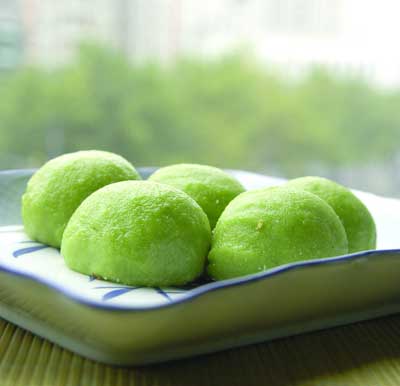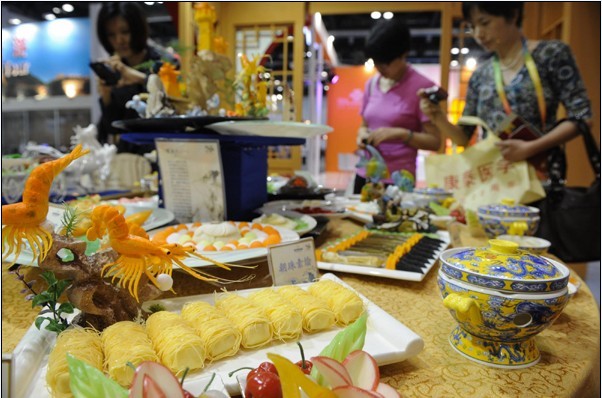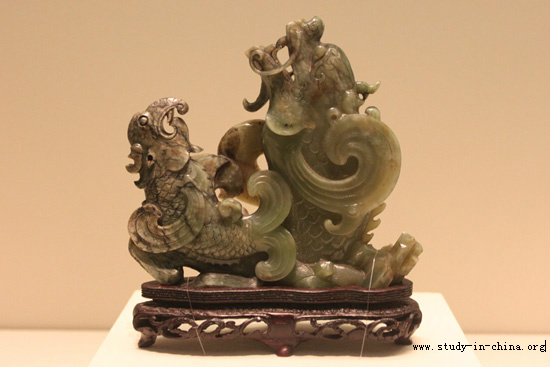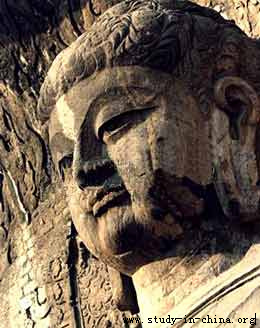| Home > China Feature |
Foods for Qingming Festival (Tomb-Sweeping Day)
Different places have different foods for Qingming Festival.

As Qingming (“tomb sweeping”) Festival and Cold Food Festival are on the same day, people in some places still have the custom of eating cold food on Qingming Festival. In Jimo of Shandong, people eat eggs and cold cake; in Laiyang, Zhaoyuan and Changdao of Shandong, people eat eggs and cold broomcorn. In Tai’an, people eat cold pancake with chicory.
It is said that eating Qingming Festival food can make people’s eyes brighter. In central Shanxi, people do not even use fire for one day before Qingming Festival. In south Shanxi Province, people usually eat steamed bread for Qingming Festival. The bread is made into the shape of a dragon with walnuts, dates and beans inside. An egg is stuck in the central part of the dragon, which is called zifu (“good luck for the son”). A very large zifu should be cooked to represent family reunification and happiness, as well as to offer sacrifice to deceased ancestors. After sweeping the tomb, the whole family divides and eats the zifu. According to an old custom in Shanghai, people collected the steamed confections in wicker baskets and dried them for a sacrifice offering ceremony. On the day of Lixia (beginning of summer), the candies would be fried in oil for children. It is said that eating the food on Lixia can help children prevent summer fever.
In Shanghai, people eat green rice balls during Qingming Festival. People mix the brome-grass juice with glutinous rice flour and make them into balls with sweetened bean paste and jujube paste as stuffing. Then, the balls are placed on reed leaves and steamed in steamers. The cooked balls are green and fragrant. It is the most seasonable food for Qingming Festival in Shanghai. In Shanghai, some people like eating peach-blossom porridge on Qingming Festival and use anchovy for sweep tombs and for dinners.
In Huzhou of Zhejiang, people make zongzi (a kind of pyramid-shaped dumpling made of glutinous rice wrapped in reed leaves) at home for tomb sweeping. They can also bring zongzi for hiking. As the saying goes, “In Qingming, zongzi is the major food.”
Around the time of Qingming, snails are very fat. There is a proverb, “A snail in Qingming is as big as a goose.” In rural families, people have the custom of eating snails on Qingming Festival. On the day, people pick out the snail flesh with needles for cooking, which is called tiaoqing. Then, they threw the snail shells on the roofs and the sound of shells rolling on the roof can drive mice away. Without mice, people can raise silkworms at home after Qingming Festival. On the Qingming Festival, community feasts are usually held and families of the same ancestral halls gather together for the feast. For people with no ancestral hall, families with the same great grandfather gather together for the feasts. The dishes for the feasts are mainly fish, meat, tofu and vegetables. They also drink homemade liquor.
In Heshan Town of Tongxiang in Zhejiang Province, there is a saying, “Qingming Festival is as important as the Spring Festival.” At night, a family usually have a reunion dinner with traditional dishes including fried snails, glutinous rice in lotus roots, faya dou (beans with buds), and malantou (a kind of wild green vegetable). Actually, these dishes are related to silkworm cultivation. People threw the snail shells on the roofs and the sound of shells rolling on the roof could drive mice away. Other worms would inhabit the shells and would not go out to harm silkworms. Eating lotus roots implies the hope that the silkworms can produce plenty of high-quality silk. Faya dou implies the meaning of becoming rich as faya is similar with fajia (becoming a rich family) in Chinese.
Art
 more
moreChina Beijing International Diet ...
Recently, The hit CCTV documentary, A Bite of China, shown at 10:40 ...

Exhibition of Ancient Chinese Jad...
At least 8,000 years ago, Chinese ancestors discovered a beautiful...

Longmen Grottoes
The Longmen Grottoes, located near Luoyang, Henan Province, are a tr...

Custom
 more
moreWeb Dictionary
Martial Arts
Tai Chi Master Class Held in Moscow
MOSCOW, June 15, 2016 (Xinhua) -- Students learn from Shaolin ...
Celebriting 70 years' efforts in restoring Mogao...
Work is being carried out at the restoration site of cave No 98 a...
Hong Kong Children's Symphony performs in Seattle
Under the theme of Tribute to the Golden Age, a concert featuring a ...





 print
print  email
email  Favorite
Favorite  Transtlate
Transtlate 








